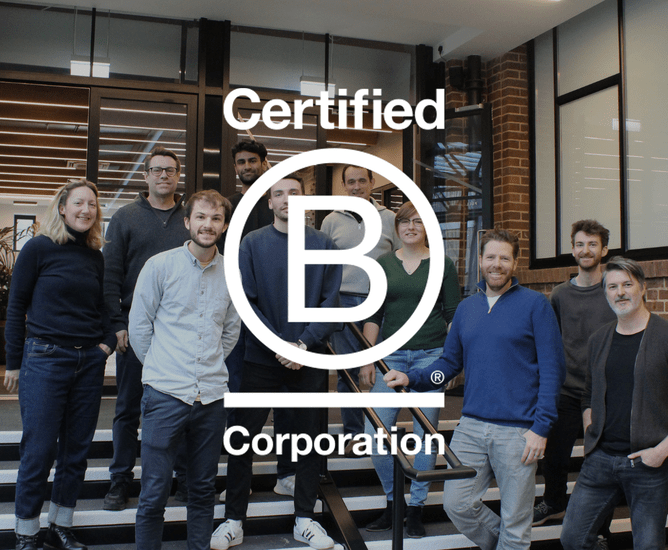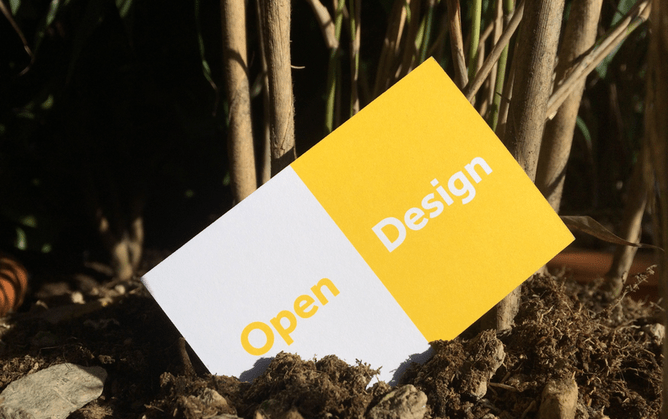It's B Corp month in March and this year, the theme is 'Behind the B'. Whilst many industrial design and engineering teams have sustainability front of mind, not many have certified as a B Corp yet. So we wanted to take this opportunity, 18 months into our B Corp certification, to share our perspective of what B Corp means to us, through the eyes of Bob Turner, one of our Product Design Engineers.
For businesses working in the area of physical product design and engineering, weighing up the cost benefit of becoming a B Corporation can be a challenge. So we hope you find these takeaways from a workshop we ran last year, useful. Bob's editorial is around the theme of the session: 'Can Business be a Force for Good?' We've included the replay below for you to watch.
By Bob Turner, Product Design Engineer
The event we hosted, offered the chance to discuss some of our thoughts and opinions about how businesses can be a force for good, with people from a wide range of backgrounds both inside and outside of The Imagination Factory.
It was a refreshing opportunity to come together and spend some time looking at the long-term instead of the short-term. Sometimes it is so easy to focus on the here and now that it is easy to neglect thinking about loftier future goals and ambitions.
How far should businesses go to be a force for good?
Business as a force for good seems like a great goal, but what does it mean, and how do we achieve this? A lot of discussion came out of this idea about what exactly is meant by “good” and how far businesses can and should go to achieve this?
Mark shared an interesting story about a quest to find cradle-to-cradle business cards. Sourcing the card was easy enough with many companies in the UK printing on sustainable card. However, sourcing the non-toxic ink proved challenging resulting in having to liaise with a company in Austria.
This raises another interesting point that came up several times during the discussion – the idea of doing good by doing bad. Whilst printing on non-toxic ink is good, the carbon emissions from sourcing it in Austria is bad. How do we decide what the lesser of two evils is in situations like this, and how can we prevent this trade off?
End of life recovery
There was a discussion in our group about insulation panels and how it is something that does good but uses harmful, hazardous materials and there is no incentive for end-of-life recovery. Do the ends justify the means? Is this a situation where you should be content with the harm done because it ultimately does good in the end?
What's the role of Government?
Government has a role to play in forcing businesses to do good, however there is a lot that businesses can do better without the involvement of governments. Running a business is a fine balancing act between different values. For a business to be successful it must make money, however this does not mean that businesses have to do harm in the process.
Thankfully, there is a lot of incentive to move towards sustainability and good procedures. Customers are becoming more aware of what goes on behind closed doors and people want to give their money to businesses that share their own personal values.
Whilst government can make bad companies be less bad, they don’t necessarily create companies that do good – it is up to business leaders to take the initiative and see the opportunity in becoming good to lure both customers and talent to the organisation.
Better Business
I think that people are becoming aware that there are businesses who are genuinely trying to be a force for good.
For me, this is one of the most exciting things about B-Corp – it gives customers an easy way to discern between companies who are genuinely striving to do better and companies who might want to do better but do not go far enough.
There is an overwhelming feeling that we should not be satisfied with just doing the bare minimum to meet the lacklustre targets set to us by governments. Businesses need to honestly and openly look at their practices and recognise their own downfalls and take positive steps to address and change these.
It is something that is easier said than done, but it is an important step towards businesses genuinely being recognised as a force for good.
You can see the workshop replay below or, if you want to know more of our thoughts about B-Corp, click here. If you have any questions or would like to know more about how we can work with you, please get in touch with one of the team here.
Written by Bob Turner. Bob is a Product Design Engineer at The Imagination Factory, who gets excited when solving real world problems by applying design, engineering and technological know-how.




